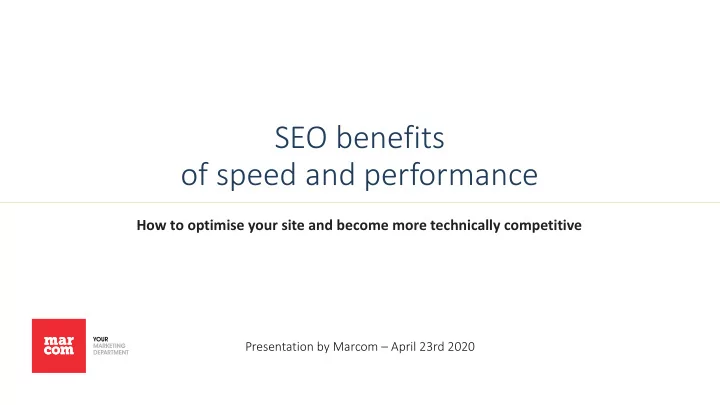

SEO benefits of speed and performance How to optimise your site and become more technically competitive Presentation by Marcom – April 23rd 2020
Introduction “ • Overview Why does speed and performance effect SEO and how? • Mark Baines (Chartered Marketer) • Th Their ir expe xperie rience and d de deep p Ben Powell (Digital Marketing Specialist) • Gil Drori (SEO and social media expert) • spec sp ecial alism sms s in creat eating • Objectives webs we bsite ites, ma marketin ting Review how Google scrutinises your website performance • mate ma teria rials ls and d SEO O Understand ways of improving your website performance • campaigns ca gns ha has r res esul ulted ed i in a n a • Outcomes vibrant vi nt A2D b A2D bus usines ness cul cultur ure e Have some knowhow to carry out a basic performance assessment • Learn some technical approaches to help boost your SEO ” • an and st strong growth. Alun Parry, CEO, A2D Solutions
Why is speed important? Improving your site speed is important for better search rankings: • In 2018, Google made it an actual direct ranking factor. • Page Speed is the speed at which an individual page loads on your website. • Google will give two scores: one for the mobile version and one for the desktop version. • On desktop, the score is generally higher because the connection speed is normally higher. That’s why mobile comes first, as mobile devices usually have slower connections. • But speed is relative. It depends on so many factors, we can only work with what we have, which is our website and our server . As of 2018, more than 50% of search engine users search on mobile devices. Make sure you focus on improving your site speed for mobile devices.
How performance effects SEO Speed is measured in seconds, not in points from 0 to 100: • Google and other search engines penalise sites that perform poorly but more importantly, so do users because of a diminished user experience. • Poor page speed can also affect rankings indirectly, by increasing the bounce rate and reducing dwell time. • A good website should load in about 3 seconds. A really, really fast one should load in 1. • Page speed is not site speed - understanding the factors of website speed is more important for improvement overall than obsessing over a page speed score. • Quality should not be compromised in terms of SEO; the fact is some of your web pages will simply load slower than others. At Google, users come first. Much of the world is still on the 3G network. Studies by Google show that average 3G loading speed is very slow. They also show that 53% (2018) of users leave the site after about 3 seconds. Google doesn’t like ranking sites which provide bad user experience.
Assess your situation Some tools for the job: • Google PageSpeed Insights - Link • Google Lighthouse site audit - (next slide) • Cross comparison tools: Think with Google (the simple view) o Pingdom Speed Test (alt locations) o GTmetrix (drill down) o It’s important to assess page loading audits across different tools for a comparison. Page speed isn’t a score, like PageSpeed Insights presents. It’s a web page’s loading time and it is measured in seconds. That’s what matters.
Lighthouse Audit in Google Chrome (Incognito mode!)
What is Google looking for? PageSpeed Insights: …and the meaning please? • First Contentful Paint - • When the user sees something on your web page for the first time. • First Meaningful Paint - • When the user can actually understand the first piece of content. • How quickly elements on your website are visibly populated. • Speed Index - • The site has loaded enough to handle a user’s first input. • First CPU Idle - • Everything has loaded in the device’s memory and can now be used. • Time to Interactive - • The delay or lag a user experiences from the point at which they • Max Potential First Input Delay - interact with the browser to the point at which the browser responds. (This is the only performance metric which doesn’t affect the page speed score). Different pages can have different speeds due to factors such as images and scripts.
Improve your performance What to focus on: • Web services: Hosting performance o Server response time o Maintenance and monitoring o • Web build and programming improvements Focus on best practices and possible improvements, prioritised by their impact on your site’s speed.
Practical performance tactics What to discuss with your developers: • Web build and programming improvements: o Better code - minification and script compression o Combine Files to Reduce HTTP Requests o Lazy loading scripts and high-res images o CDN and content optimisation o Image compression o Caching policies – short and long o AMP – Mobile alternative If you’re mostly focused on local SEO, choose a local server. For example, if most of your audience lives in London, choose a server with the datacenter in London.
Q&A Click on the Q&A button in Zoom and ask us a question +44 (0) 7860 799426 mar-com.net info@mar-com.net
Next webinar On May 7 th we'll be begin our series on strategic social media
How we help “ Marco com were brilliant! They made soci cial media a strategic c reality fo for us…we co could not have ” don done it it wit withou out them! Pippa Russell, Head of Corporate Communications, Novia Financial
Let’s meet +44 (0) 7860 799426 mar-com.net info@mar-com.net
Recommend
More recommend